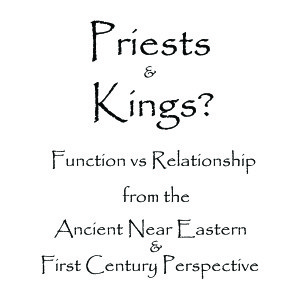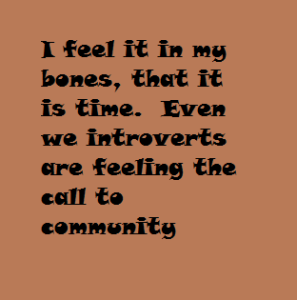A Nation of Priests and Kings Pt 2 – The Individual Mandate to do Justice and Righteousness
 (I am leaving this blog up not because it is entirely accurate – I have since learned that the “kings and priests” is actually rendered better a “kingdom of priests” but otherwise, our call to justice and righteousness is the same – we study and keep learning, eh?)
(I am leaving this blog up not because it is entirely accurate – I have since learned that the “kings and priests” is actually rendered better a “kingdom of priests” but otherwise, our call to justice and righteousness is the same – we study and keep learning, eh?)
This is a follow up to my ancient Near Eastern explanation of the Biblical phrase “a nation of Kings and Priests” – which is so easily misunderstood and twisted. I have decided to add to it because not only were the Israelites, as a nation, given the relationship with YHVH that in the ancient world was reserved only for kings and priests, but they were also uniquely given a mandate to perform the types of righteous and just acts that in the rest of the world were only demanded of incoming kings.
In the ancient Near East, kings were expected to do certain things when coming to the throne – acts that were required by the Torah (the first five books of the Bible) of all citizens of God’s Kingdom. Earthly kings were expected to forgive debt, free slaves, punish oppressors, and take care of the “least of these” – the poor, widowed, and orphan – upon ascension to the throne in order to establish themselves as righteous and just rulers. Once established, they often had no desire to ever repeat that sort of kingly generosity again! Forgiving debt and freeing slaves and punishing wealthy merchants who were cheating their customers and robbing widows houses was not the sort of thing that made ANE kings popular with the wealthy and powerful men in their kingdom – but it did go a long way towards establishing their honor and reputation among ” the rabble.”
Now these were the unwritten laws of the Ancient Near East, an absolute expectation of an incoming monarch (which should make King Rehoboam’s refusal in I Kings 12 to provide tax relief seem all the more shocking and the subsequent splitting of the Kingdom make much more sense – even heathen kings would have provided that tax relief!) – but certainly not the expectation upon the actions of everyday citizens, who had no desire to free their slaves unless a new king forced them to, or to stop foreclosure on the land of a widow, or to forgive the debts owed to them – and it certainly wasn’t the sort of act that was on any sort of schedule – but YHVH changed that in Torah Law, the constitution of the Kingdom of Heaven.
The Kingdom of Heaven operates on a seven year cycle when it comes to the release of debts (Deut 15:1-3) and the release of slaves (Ex 21:2). Ancestral land sold in order to pay debts was to be restored to the family in the Jubilee year (a 50 year cycle – Lev 25: 13-16, 27:24). The Israelites were always commanded to take care of the widowed, poor and orphaned (Ex 22:22-24, Deut 14:29) and every three years there was a special tithe given just for their upkeep so that there would never be an Israelite truly impoverished and starving (Deut 26:12). Equal weights and measures in business dealings were a continual commandment (Lev 19:36, etc.). The guilty, and not the innocent, were to be punished for their crimes (Deut 22:25-27). Neither the rich nor the poor were to be favored in court cases (Ex 23:6, Lev 19:15). Female prisoners of war could not be mistreated and during times of war (Deut 21:10-13), a city must be given the opportunity for surrender before being attacked (Deut 20:10-12). Foreigners had to be treated with equity and could not be persecuted (Ex 22:21, 23:9).
These were not the ways of the Ancient Near East – this was a radical and continual mandate of each citizen to be both fair, generous and merciful. The Laws of God placed upon each citizen the obligation to do forever what earthly kings only did in order to curry favor with the people. The Code of Hammurabi, for example, had varying degrees of punishment based on who the victim of the crime was! The penalty for harming a rich man, or a priest, was exponentially higher than for doing harm to a peasant. But Israel’s law set all Israelites as equal in the eyes of the justice system – on par with ANE kings and priests when it came to personal worth, as well as in the personal responsibility to do justly and righteously.
And so, when we come into Covenant with this great God and King, we truly do become a nation of kings and priests – having the access to pray and make petitions, the obligation of exclusive worship in our obedience, the mandate to do justice and righteousness, and the personal worth ascribed by the rest of the world (and their gods) to the elite classes. And although it does not give us the physical priesthood and kingship as believers, it does in fact set us on par with the kings and priests of the world in terms of relationship.
As any physical kingship in the Kingdom of Heaven must come from the line of David through Solomon by Royal Grant, so the physical priesthood must come through Aaron – both are perpetual ordinances. But what we have been given, as believers, is an incredible testament to a merciful, just and righteous God – unlike any other the world has ever claimed to know. We have the spiritual access to our God that only the elite of the polytheistic world had with their gods, and we each have the obligations to behave as good kings in the midst of a crooked and corrupt world. Truly we serve a God and King like no other ever imagined.



